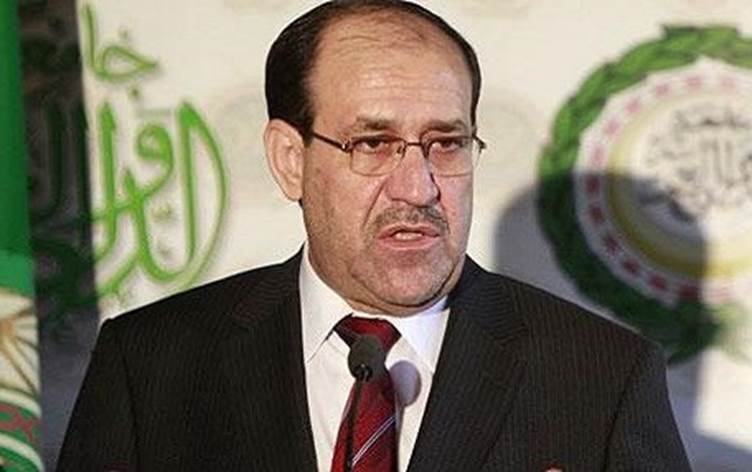The former Prime Minister of Iraq Nouri al-Maliki praised Iran and Shiite militias for fighting the Islamic State (ISIS) while simultaneously alleging that Sunni politicians in Iraq have sided with “terrorists”, and arguing that Iraq’s Kurds had no right to call for independence.
Speaking to Iran’s al-Alam news channel on Tuesday Maliki insisted that the Shiite-majority coalition of militia groups known as Hashd al-Shaabi are “essential” for the war against Islamic State (ISIS).
Given their combat experience Maliki believes they should become a new security force in Iraq which wouldn’t necessarily replace the existing Iraqi Security Forces (ISF) but would nevertheless “address situations like the one Iraq currently finds itself in.”
Maliki said that without Iraq’s Sunnis and Kurds there could be no Iraq arguing that there needs to be more trust between them for Iraq to progress as a unified nation state.
He slammed the idea that the Sunnis were marginalized arguing that such talk “is rhetoric” which is used by “political and regional forces that oppose the new Iraq and use it [as] a hook to hang their ideas, attitudes, desires and struggle.”
Furthermore, Maliki accused Sunni members of government of directly supporting terrorist groups.
“These people supported the government by day and by night they are part of terrorist organizations. And this is what happened, and this is not marginalization,” Maliki alleged.
The former Prime Minister also argued that Iraq’s Kurds have no right to opt for full independence from Iraq arguing that such a move would have a negative effect on Baghdad, Erbil and the surrounding region and said a partition of Iraq would be an “absolute evil.”
Maliki praised Iran’s contribution to the Iraqi war effort against ISIS arguing that Iran has done more than anyone else to help Iraq. He disputed the notion that Iran’s heavy involvement in the war against ISIS on Iraqi soil constituted interference in Iraq’s internal affairs.
On Muqtada al-Sadr’s supporters, who have pressured the government to implement fundamental reforms, Maliki argued that pressuring the government to reform through protests “is robbery [done] in order to control the political process and direct it how these political currents and entities want.”
Maliki was Prime Minister of Iraq from 2006 until 2014; he was unable to stand for a third term in late 2014 after he was blamed for losing large swaths of Iraqi territory to ISIS.
Speaking to Iran’s al-Alam news channel on Tuesday Maliki insisted that the Shiite-majority coalition of militia groups known as Hashd al-Shaabi are “essential” for the war against Islamic State (ISIS).
Given their combat experience Maliki believes they should become a new security force in Iraq which wouldn’t necessarily replace the existing Iraqi Security Forces (ISF) but would nevertheless “address situations like the one Iraq currently finds itself in.”
Maliki said that without Iraq’s Sunnis and Kurds there could be no Iraq arguing that there needs to be more trust between them for Iraq to progress as a unified nation state.
He slammed the idea that the Sunnis were marginalized arguing that such talk “is rhetoric” which is used by “political and regional forces that oppose the new Iraq and use it [as] a hook to hang their ideas, attitudes, desires and struggle.”
Furthermore, Maliki accused Sunni members of government of directly supporting terrorist groups.
“These people supported the government by day and by night they are part of terrorist organizations. And this is what happened, and this is not marginalization,” Maliki alleged.
The former Prime Minister also argued that Iraq’s Kurds have no right to opt for full independence from Iraq arguing that such a move would have a negative effect on Baghdad, Erbil and the surrounding region and said a partition of Iraq would be an “absolute evil.”
Maliki praised Iran’s contribution to the Iraqi war effort against ISIS arguing that Iran has done more than anyone else to help Iraq. He disputed the notion that Iran’s heavy involvement in the war against ISIS on Iraqi soil constituted interference in Iraq’s internal affairs.
On Muqtada al-Sadr’s supporters, who have pressured the government to implement fundamental reforms, Maliki argued that pressuring the government to reform through protests “is robbery [done] in order to control the political process and direct it how these political currents and entities want.”
Maliki was Prime Minister of Iraq from 2006 until 2014; he was unable to stand for a third term in late 2014 after he was blamed for losing large swaths of Iraqi territory to ISIS.




Comments
Rudaw moderates all comments submitted on our website. We welcome comments which are relevant to the article and encourage further discussion about the issues that matter to you. We also welcome constructive criticism about Rudaw.
To be approved for publication, however, your comments must meet our community guidelines.
We will not tolerate the following: profanity, threats, personal attacks, vulgarity, abuse (such as sexism, racism, homophobia or xenophobia), or commercial or personal promotion.
Comments that do not meet our guidelines will be rejected. Comments are not edited – they are either approved or rejected.
Post a comment